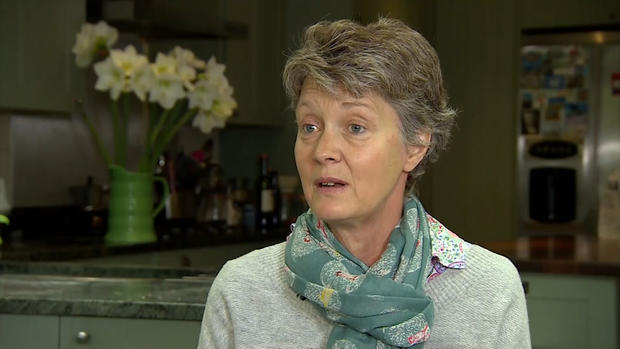Experimental ultrasound treatment zaps cancer pain
Former school teacher Moira Rogers was diagnosed with breast cancer two years ago. It quickly spread to her bones, causing unbearable pain in her arm.
"I was so frightened and my life just seemed to be sort of shortened," she said. "When you're feeling the pain, you know you have cancer, and you think about cancer, and there's just this big C-word envelops your life."
She found new hope from an innovative treatment being developed at London's Royal Marsden Hospital.
Specialists there used high-intensity focused ultrasound to blast cells in her bones that were triggering her pain. Rogers was part of a small clinical trial testing the new therapy, and she says it made a remarkable difference.
"I'm amazed how I don't really feel anything now, I feel very little pain," she said.
Dr. Nandita deSouza, professor of translational imaging at the Institute of Cancer Research at Royal Marsden, explained that high-intensity focused ultrasound, or HiFu, as they call it, kills the pain by essentially burning the nerve endings that cause pain.
The equipment is embedded in the bed of an MRI scanner. "You're passing ultrasound at a higher power through the tissues to a very tight focus, which means that at the focal point, you get what we call a thermal burn. So you're actually just burning tissue very precisely at the focal point of the ultrasound," she said.
The treatment itself is not pain-free. "In essence you're burning the lesion area, the cells. So it hurt a lot, but just for a very brief few minutes," Rogers said.
She said it took a few days to start feeling improvement, and after a few weeks the improvement was dramatic.
"When the pain is less, or the pain is gone, you're back to being normal. You don't want to be treated as the victim. You're just who you were before. And that has been unbelievable."
The hospital has treated nine patients with the technique so far.
"They're all patients who've got tumors within the bone that are painful," deSouza said. "These patients have usually had all forms of other treatment and nothing is working. They've had radiotherapy or radiation therapy to the painful area. They're on a lot of analgesic medications, that makes them feel groggy during the day. It's not a pleasant experience spending your life in a sort of fog because you are on a lot of painkillers. So if they can reduce that medication, and have a time that is pain-free, that is really valuable quality time for them."
Rogers says after undergoing the "tailor-made treatments," she feels good enough to travel and go on long walks that she was afraid to tackle a year ago.
"What does the future hold? I don't know. But I suddenly don't feel held back," she said.
This clinical trial focused on targeting bone pain, rather than aiming at the cancer itself, but researchers hope that in the future, HiFu could be used as a tool to kill prostate and breast cancer cells.
Scientists say once they perfect the ultrasound it will be able to precisely target the tumors without harming nearby healthy tissue.
